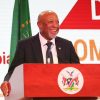Omanyano ovanhu koikundaneki yomalungula kashili paveta, Commisiner Sakaria takunghilile
Veronika Haulenga
Omanyano ovanhu koikundaneki yomalungula kashili paveta, Commisiner Sakaria takunghilile
Veronika Haulenga
Listeners:
Top listeners:
-
play_arrow
Omanyano ovanhu koikundaneki yomalungula kashili paveta, Commisiner Sakaria takunghilile Veronika Haulenga
Reflection on local content policies: A catalyst for Namibia’s economic development and growth


Opinion piece By Josef Kefas Sheehama
On April 16–18, 2024, in Lüderitz, the Namibia Chamber of Commerce and Industry (NCCI) and Antila Consultancy organized a local content oil and gas conference with the theme, “Empowering Namibia’s Energy Ambitions by Connecting Industry and Indigenous Talent.”
According to Article 100 of Namibia’s Constitution that, ” Land, water, and natural resources below and above the surface of the land and in the continental shelf and within the territorial waters and the exclusive economic zone of Namibia shall belong to the State if they are not otherwise lawfully owned”. Therefore, the wealth embodied in natural resources makes up a significant proportion of the wealth of the nation”. Consequently, the maintenance of a system of checks and balances is made possible by the separation of powers.
It was an honor for me to attend the Oil and Gas Conference, where the local and global community was more involved. I believe Namibia is among the most resource-rich nations, and that our educational system needs to be reevaluated and, if feasible, changed. Not only for basic education but also to improve Namibia’s technical colleges. The right-sizing of local content policies can encourage financial investment and technological transfers that will benefit Namibia competing to attract the best international community, as well as investors searching for the most attractive markets to maximize efficiencies and manage costs. Namibia’s political stability contributes to increased investor’s confidence because there aren’t frequent policy changes; instead, the government is predictable, meaning that policies aren’t made one day and changed the next, as would happen in the event of an illegal change of government, which would inevitably lead to the creation of new policies.
This is especially important as governments look for ways to boost economic development and elevate local capacity. Economies and populations in nations where natural resources are mined
do not always benefit from the abundance of these resources, as many nations have recently realized. In response, the majority of resource-rich nations have adopted resource-nationalist legal frameworks to improve strategic local ownership and local economic maximization, as well as to encourage the spread of development to local economies.
Furthermore, in most resource-rich nations, local content policies have been implemented in response to the need to boost local participation in the extractive industry. By allowing local businesses to access multiple value chains and obtain more significant economic benefit, local content policies seek to regulate the extractive industry and give the state and local businesses more ownership. Increasing local involvement in employment, training, domestic benefits, and contracting to supply goods and services to the sector are crucial steps towards optimizing local take. Therefore, local content development is expected to become even more crucial for all industry stakeholders as the necessity of localizing value chains in Namibia grows. The development of capable and persistent Namibian businesses that can raise money and collaborate with the right partners both locally and globally to create profitable ventures will ultimately determine its success.
We need to understand that the purpose of the policy is to make it possible for local companies, workers, and inputs to take part in the extractive industry. Note that local content is more complicated than it first appears. This is due to the fact that it is not an automatic accomplishment. It is true that legal content demands nations to have a highly skilled labor force, robust institutions, and a thriving industrial base that is readily connected to the relevant sector. In order to accommodate investors and benefit the local community as well as achieve economic emancipation, the nation must effectively manage local content. Legislators must enact measures that are welcoming to investors because they will drive away capital. The fact that Namibia is in competition with other nations means that local content policies ought to benefit the local and global economies. In order to prevent political instability, Namibia should discourage corruption, selfishness, and fanaticism. Natural resources ought to benefit everyone and lessen poverty and economic inequality.
Furthermore, since implementing stricter monitoring procedures or enacting policies for the oil and gas industry will impede development and growth, these measures should be realistically and economically justified. It is therefore necessary to have controls, but we also need to consider the extent to which those controls are obstacles and devise strategies to minimize their impact. The tight exchange control regulations in Namibia may make it difficult for the oil and gas sector to expand, so the Bank of Namibia must take this into account. Anti-money laundering (AML) is a necessary response to financial crimes, but Namibia must be careful not to lose foreign direct investment (FDI) due to an overly strict exchange control policy.
Moreover, disagreement and resource curses have no place in our society. The nation’s fastest-growing economic sector is natural resources, which serve as the foundation of the economy. It is also stated that the majority of this industry is related to mining. The conventional view is that resource revenues should create wealth and advance economic growth. Adopting economic policies that support economic expansion is a sign of sound economic policy. Adopting political tactics that serve the interests of politicians over those of the people is referred to as bad politics. Good economics and good politics are usually determined by the kind of governance and the political structure.
Although it’s still early, Namibia should begin preparing to join OPEC in order to gain access to energy-related technology, resources, and expertise. This will improve Namibia’s capacity to meet domestic energy needs and reduce dependency on outside sources. Although we know there is still a long way to go, as a nation we must aim high and join the ranks of major oil producers. Additionally, the impact of development should be prioritized over regulations. Goals for policies ought to be specific. It is counterproductive to overregulate, particularly when capacity is limited. Governments and businesses must collaborate as well as interact with other stakeholders, such as local governments, universities, and communities. It is politically and economically necessary to create jobs.
To this end, the main goals for policy development is the creation of local content policies and regulations. This is part of a plan to boost oil and gas benefits in order to encourage economic transformation. Local content policies have the potential to be a powerful tool for Namibia’s economic development and growth if they are developed and put into practice correctly.
Thus, the necessity of strategic alliances between domestic and international businesses is advised.
Written by: Staff Writer
Collaboration Economic development energy ambitions extractive industry foreign direct investment Governance local content local participation Namibia Natural resources oil and gas conference policy development political stability sustainable growth
Windhoek Weather
Most popular

Mbumba signs off new benefits for retired political office bearers

Former FNB employee arrested after defraud pensioner off N$215, 000

Namdia Heist: More questions, lots of confusion

Omuhwahwameki Michael okuunganeka oshikonga shoku patitha oostola dho Rani moshilongo ashihe.

Walvis Bay woman loses over N$777.000 to a fraudster
Copyright 2025 Future Media (Pty) Ltd | Website by Digital Platforms
Tel: +264 83 000 1000 | Email: news@futuremedia.com.na





